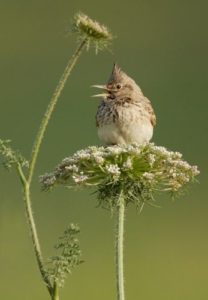
The Lark is real but mythological even spiritual in its abilities; melodious singing while soaring through the skies, a messenger of the Lakota god, Okavango, representative of the south wind, the direction of the sun and thus the bringer of warmth, light and life. The soaring Lark is viewed by many as a symbol of humankind’s journey from Earth to Heaven and back.
Farzin and I were on our way to the gym and the music from the classical station had hypnotized me with its poignancy and power. I looked at Farzin and asked him if he was listening. We pulled into the parking space and as Farzin began to turn the car off, I asked him to leave the music on and to just listen. I love the violin and this piece had an exqisite soaring violin melody. I would find out later that it was Vaughan Williams’ The Lark Ascending.
Farzin admired the work but his favorites were of Beethoven, particularly the Fifth and Ninth Symphonies. The Ninth Symphony, which premiered in Vienna in 1824, was conducted by an almost totally deaf Beethoven, a feat beyond brilliance, suggestive of an inner musical world. There is no doubt Farzin had a keen appreciation of classical music and experienced a deep sense of, dare I say serenity, from many gorgeous compositions.
Music affects the brain and mood. Brahm’s Violin Concerto can release the deepest pathos within me, even if those emotions are at the subconcious level. Suddenly I am transposed, uplighted to a reality or understanding of the world. It is an exquisitely melancholy world. At concerts Farzin would sometimes appear transfixed as if he and the music became inseparable. He wouldn’t move a muscle for the longest time.
I know the poweful soothing effect music can provide to a troubled soul, providing solace, releasing emotions, invoking memories and providing meaning. Its potency is akin to a universal life source.
I attended a Renee Fleming concert recently with my beautiful niece, Alayna. Richard Strauss took center stage with the beautiful diva. Fleming sang two of the songs from Strauss’ so-called Last Four Songs, which was his swannsong to the world. The songs are an awareness and even an acceptance of death, while fully appreciative even in awe of the season’s beauties that linger on their way to death. The poem and song “September” is not melancholy in its imagery of the setting sun, longing “to close its great, wearied eyes”.
SEPTEMBER
– Hermann Hesse
The garden is in mourning:
the rain sinks coolly on the flowers. Summertime shudders
quietly to its close.
Leaf upon golden leaf is dropping
down from the tall acacia tree.
Summer smiles, amazed and exhausted, on the dying dream that was this garden.
Long by the roses still
it tarries, yearns for rest,
slowly closes its (great)
weary eyes.
The Final Song, At Sunset, is truly exquisite. A couple, tired by life’s long road of joy and sorrow, sit together perhaps for the last time as the darkening sky encompasses them and the soaring two larks. There is a tranquility and truthfulness that is so profound at this point in the evening at this time in their lives, they wonder, “…is this perchance death?”
At Sunset
– Joseph Karl Benedikt Freiherr von Eichendorf
Through want and joy we have walked hand in hand;
we are both resting from our travels now, the quiet countryside below us.
Around us the valleys incline; already the air grows dark.
Two larks still soar alone half-dreaming, into the haze.
Come here, and let them fly about; soon it is time for sleep.
We must not go astray
in this solitude.
O spacious, tranquil peace,
so profound in the gloaming.
How tired we are of travelling –
is this perchance death?
English translation © William Mann
Farzin joined me so many times gazing at sunsets around the world in awe of their hypnotic beauty, quieted by the tranquil serenity that enveloped us, aware of the ephemeral texture of the moment. For in that moment existed both life and its death.
Eventually for Farzin there was too much pain to go through to watch another sunset. So I watch alone awash in nostalgia and yearning, with the knowledge that Farzin was a fleeting and passing, exquisite moment in time never to be recaptured or experienced again.

So beautiful. I’m happy you are now in this phase of precious memories if only for a few hours!